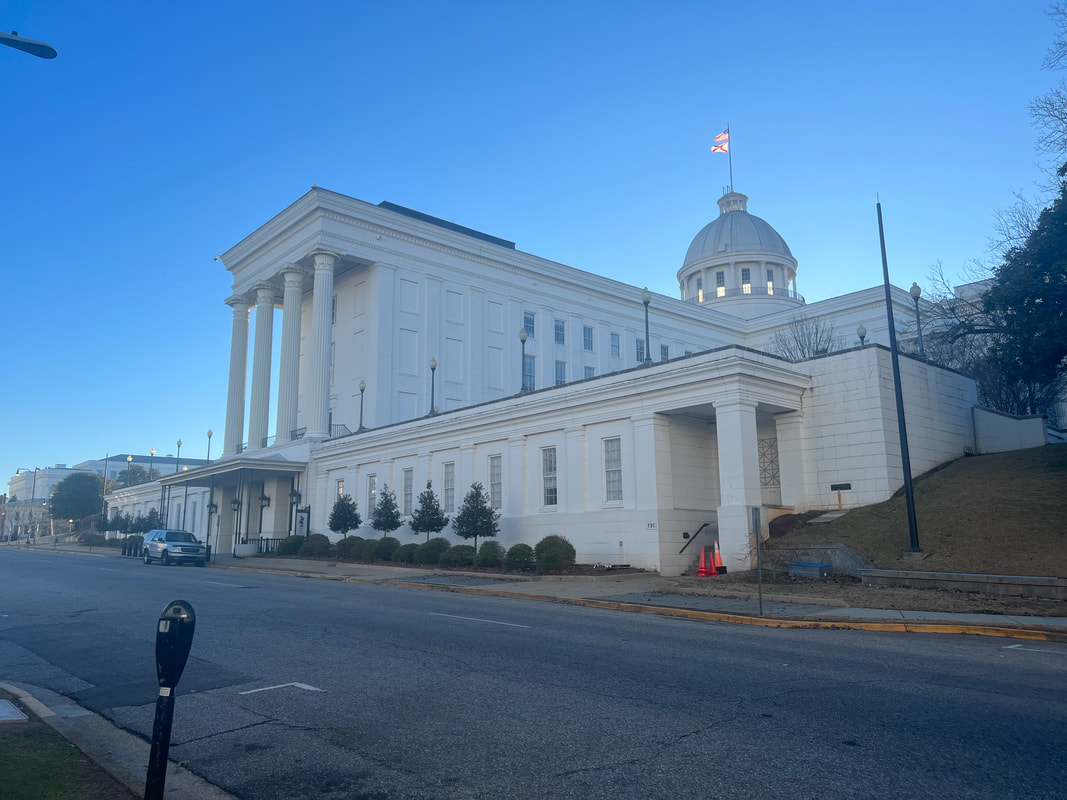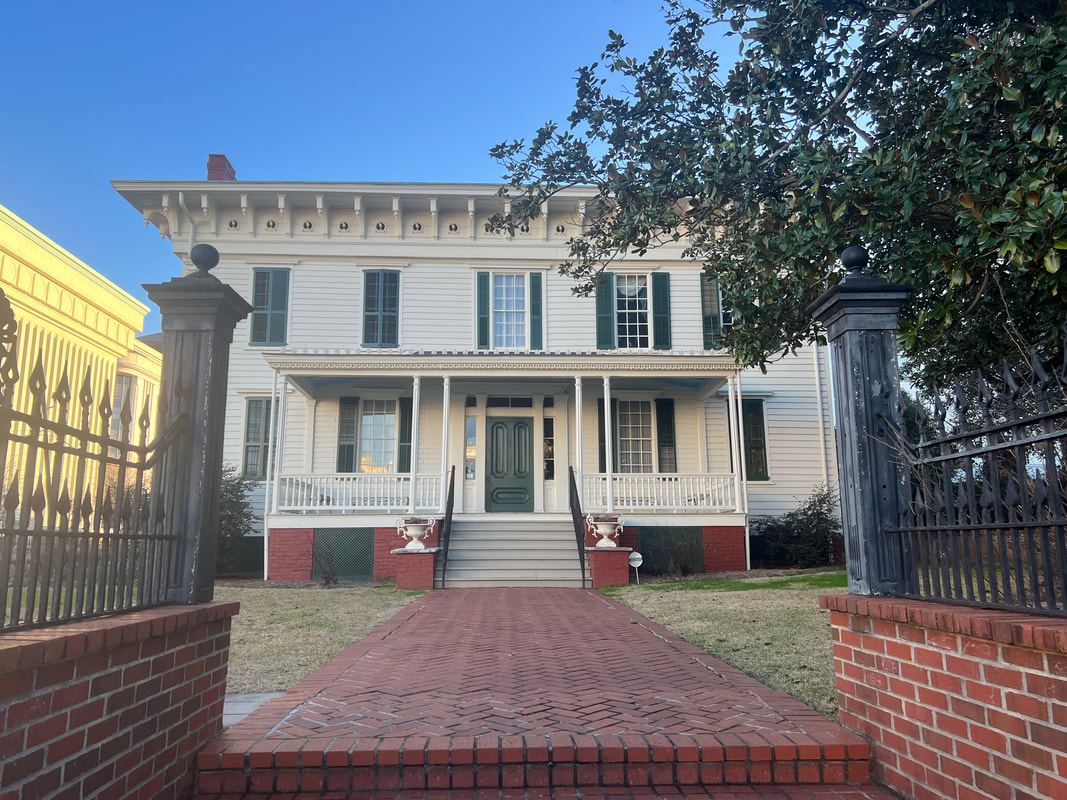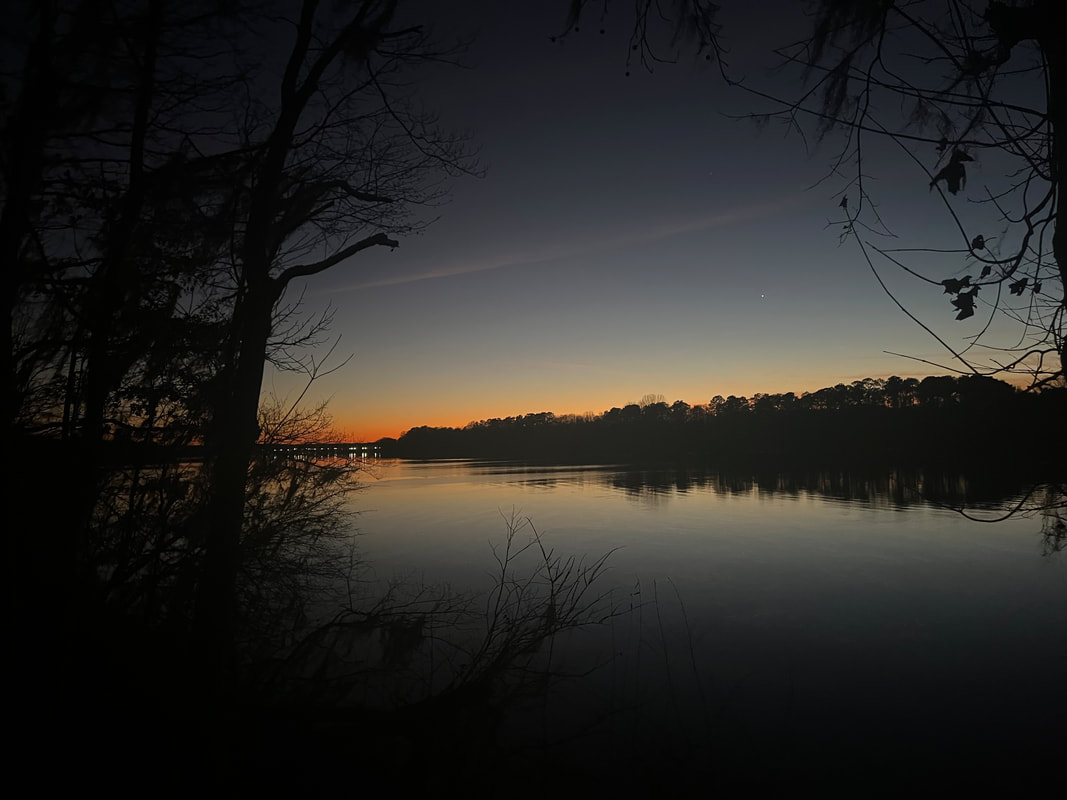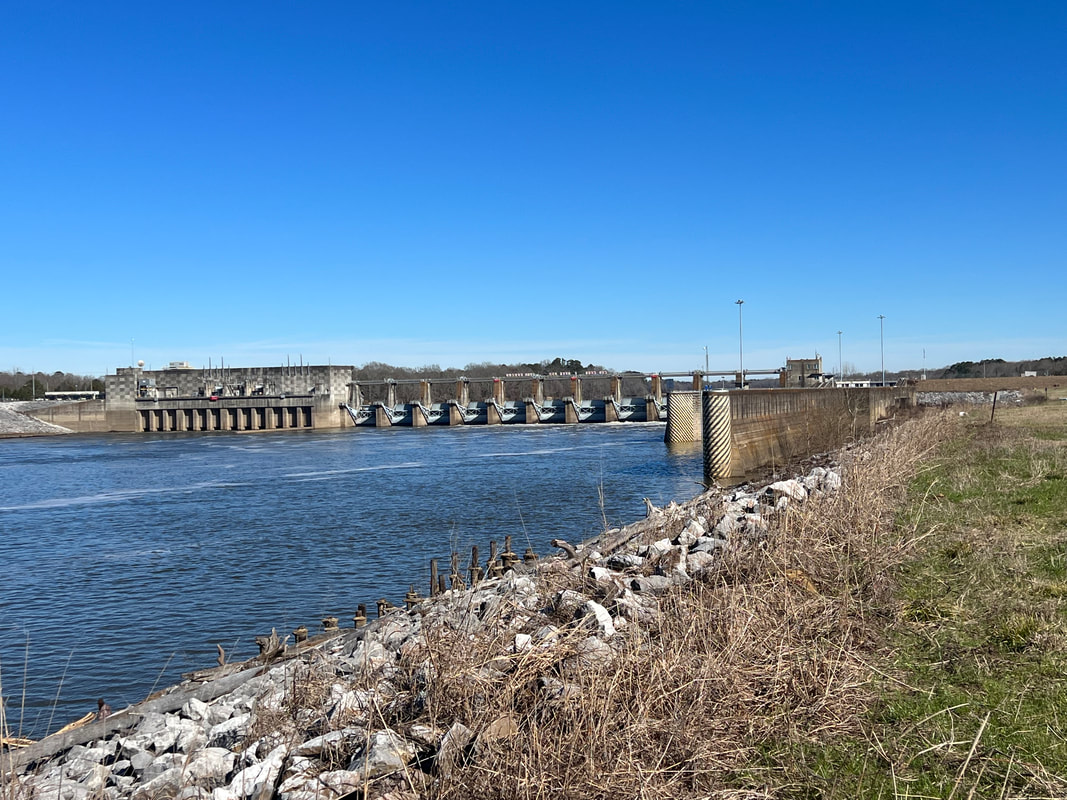As it turned out, our decision to weather the storm in the Chatahoochee-Oconee National Forest was a very good decision. We had good internet there, so we watched the band of storms cross through Mississippi and Alabama and approach us. We were really lucky, and the part of the band that went over us was relatively mild, and even the worst of the thunder and lightening went north and south of us. We had a steady rain most of the night, but woke to clearing skies in the morning and went on a nice loop hike through the forest. We decided in the morning to spend another night there since we weren’t sure of the level of damage in Alabama, so we took our time wandering through the forest and the clearings.
Friday evening, we looked at the weather report again and realized it was going to get cold, so we got on line and found an Army Corp of Engineers campground on the other side of Montgomery, our next capital. The campground had electric at every site, so we booked a site for Saturday night so we could plug in our heater and keep our batteries and water lines warm, not to mention ourselves. Since we didn’t have to worry about finding a place to park on Saturday night, we weren’t super worried about getting to the area too early in the day, so we took another walk in the National Forest on Saturday morning before leaving for Montgomery.
Even with the walk, we got ourselves together, waved goodbye to some neighbors who had pulled in after dark Friday night, and by noon we were headed for Montgomery. We decided to take the “blue highways,” so it took us a few hours to get there, and we pulled in around 4PM, which would have been 5PM had we not crossed the line between the Eastern and Central time zones. Getting into downtown Montgomery was easy, and because the streets were deserted for the weekend, we found easy street parking so we could get out and walk around. Our first impression of the capitol and the area surrounding it was that it was very white. All of the buildings are white, and while it made the area feel very clean, it also made it feel sterile. Some of that could have been, for us, the contrast to the whimsical Tallahassee which was our previous capitol. Montgomery’s capitol area doesn’t have any park surrounding it, but when we walked to the front of the building, which was opposite where we parked, we found a very energetic effort being made to set up a stage and podium in front of the capitol’s steps, and all the streets were closed. We’re not sure what was going on, although since the next day was Martin Luther King, Jr.’s birthday, we suspect that the city was having an official celebration complete with speeches from dignitaries. This all helped soften our initial impression, but since the entire walk around the block took us about a half hour, we left still feeling like Montgomery is less than the strongly beating heart of the state.
We put Prairie Creek Campground, the Army Corp of Engineers campground where we had made our reservation, into the GPS and pulled in less than an hour later after being treated to a beautiful sunset on the road. We hadn’t even realized that the Army Corp of Engineering campgrounds were a thing, but we will definitely be looking for them in the future. They’re not free, but they’re also relatively inexpensive at about $25 a night for complete hookups. And, Prairie Creek was really well laid out and well maintained, and all of the camp sites were on the riverfront since the campground is located inside an oxbow. Because this campground is primarily for fishermen and hunters in the surrounding national lands, it doesn’t have a lot of hiking trails, but on Sunday morning we took a walk through the campground and out to the dam and lock which allows boat traffic between Montgomery and Mobile. We filled our water tanks and prepared to head towards Jackson.
While we were at Prairie Creek, we realized that the pervasive petroleum smell we’d noticed in the camper was not from a motorcycle gas tank, but was from leaking propane lines. So, before heading for Jackson the next day to check off Mississippi’s capital, we needed to pick up replacement lines, and refill our propane tanks. We didn’t actually plan to get all the way to Jackson in one day, which turned out to be a good thing since finding parts and propane in the south on a Sunday which was also MLK, Jr.’s birthday wasn’t especially straightforward. However, in our quest, we were directed to check a couple of spots in Selma, which made us go where we hadn’t intended to go, so we saw the tornado damage first hand. That made us really glad we had stayed in Georgia for an extra couple of days, not only to give the tornados time to pass, but also for Selma and the surrounding communities to start assessing the damage. I wanted to say “cleaning up,” or maybe “recovering from” here, but three days after the storm, those words didn’t yet apply. I didn’t take any photos mostly because it felt disrespectful to be taking pictures of others’ massive tragedy, but also because I had already seen photos of what we were looking at in national and international news outlets, and the photos definitely didn’t capture the depth of the destruction. We saw utility poles snapped off with all of their wires in a major tangle. Entire buildings were flattened, with stuff strewn as far as we could see. One large tree had all of its branches ripped off and an entire metal roof was literally wrapped around it - and I’m using “literally” the way it’s supposed to be used here, since the roof was rolled around it like a tortilla around a burrito. We ended up not stopping in Selma since we felt compelled to just get out of the way, although industrious residents were running restaurants and other businesses out of tents and people seemed to be in generally good spirits.
We eventually found an open Tractor Supply Co and got butane and parts, and continued on our way to a free campground in the Bienville National Forest just short of Jackson. According to iOverlander, the campground was designed for horses which means it’s truck and trailer friendly, and it was easily accessible from the state highway, and it had all good reviews, so we thought it would be perfect. There was a warning that the water was most likely turned off for the winter, so we were very surprised when we pulled up to the site and found a locked gate with an “Area Closed for the Season” sign. At this point it was almost dark, so we took a quick look at one of the camping apps and found that Roosevelt State Park was only about 10 miles away, towards Jackson. We pulled in there in the dark, and found that the park office was shut down. There was an honesty cash box, but also a warning that campers shouldn’t just pay and pull into an empty spot because it’s possible that the spot was reserved. I pulled up the campground on the ReserveAmerica booking engine and found that they only allowed you to reserve two days in the future, not right now, and that Walk Up was the only option for same day reservations. With no person or place to walk up to, I scanned the campsite list and found campsites available for walk up. We left our fee in the honesty box and drove the long two miles to the campground to look for one of the walk up available sites. The campground was surprisingly busy for a Sunday night in January, but in the end we found a nice site on the lake and figured since we were only there for one night we shouldn’t be in anyone’s way. It turned out that this site also had full hookups plus a sewer, so we plugged in our heater even though it wasn’t super cold, tapped into the city water so we could keep our tanks full, and even ran a load of laundry since we had the sewer drain and didn’t have to worry about filling our gray tank. We pulled out in the morning heading for Jackson.
We eventually found an open Tractor Supply Co and got butane and parts, and continued on our way to a free campground in the Bienville National Forest just short of Jackson. According to iOverlander, the campground was designed for horses which means it’s truck and trailer friendly, and it was easily accessible from the state highway, and it had all good reviews, so we thought it would be perfect. There was a warning that the water was most likely turned off for the winter, so we were very surprised when we pulled up to the site and found a locked gate with an “Area Closed for the Season” sign. At this point it was almost dark, so we took a quick look at one of the camping apps and found that Roosevelt State Park was only about 10 miles away, towards Jackson. We pulled in there in the dark, and found that the park office was shut down. There was an honesty cash box, but also a warning that campers shouldn’t just pay and pull into an empty spot because it’s possible that the spot was reserved. I pulled up the campground on the ReserveAmerica booking engine and found that they only allowed you to reserve two days in the future, not right now, and that Walk Up was the only option for same day reservations. With no person or place to walk up to, I scanned the campsite list and found campsites available for walk up. We left our fee in the honesty box and drove the long two miles to the campground to look for one of the walk up available sites. The campground was surprisingly busy for a Sunday night in January, but in the end we found a nice site on the lake and figured since we were only there for one night we shouldn’t be in anyone’s way. It turned out that this site also had full hookups plus a sewer, so we plugged in our heater even though it wasn’t super cold, tapped into the city water so we could keep our tanks full, and even ran a load of laundry since we had the sewer drain and didn’t have to worry about filling our gray tank. We pulled out in the morning heading for Jackson.





